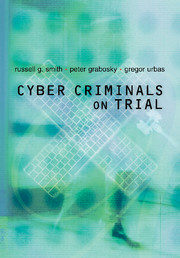Book contents
- Frontmatter
- Contents
- List of figures and tables
- Acknowledgments
- Preface
- Abbreviations
- Currency exchange rates
- Chapter One Introduction
- Chapter Two Defining and Measuring Cyber Crime
- Chapter Three The Prosecutor as Gatekeeper
- Chapter Four Cross-Border Issues
- Chapter Five Strategies of Cyber Crime Litigation
- Chapter Six The Quest for Harmonisation of Cyber Crime Laws
- Chapter Seven Judicial Punishment in Cyberspace
- Chapter Eight Sentencing Cyber Criminals
- Chapter Nine Conclusions
- References
- Appendix A Case Summaries 1972–2003
- Appendix B Selected Legislative Summaries
- Index
Chapter Three - The Prosecutor as Gatekeeper
Published online by Cambridge University Press: 22 September 2009
- Frontmatter
- Contents
- List of figures and tables
- Acknowledgments
- Preface
- Abbreviations
- Currency exchange rates
- Chapter One Introduction
- Chapter Two Defining and Measuring Cyber Crime
- Chapter Three The Prosecutor as Gatekeeper
- Chapter Four Cross-Border Issues
- Chapter Five Strategies of Cyber Crime Litigation
- Chapter Six The Quest for Harmonisation of Cyber Crime Laws
- Chapter Seven Judicial Punishment in Cyberspace
- Chapter Eight Sentencing Cyber Criminals
- Chapter Nine Conclusions
- References
- Appendix A Case Summaries 1972–2003
- Appendix B Selected Legislative Summaries
- Index
Summary
Prosecuting Cyber Crime
The extent of the prosecutor's involvement with cyber crime will vary from one country to another depending upon the prosecutor's role in the criminal justice system and on constitutional issues more generally. In civil law countries, the decision to begin an investigation may rest with the prosecutor, depending on whether coercive measures are necessary or special proceedings are required. Japanese prosecutors routinely direct investigations (Johnson 2002). Prosecutors also play a central investigative role in Korea and China (UNAFEI 1995). In the United States, especially at the federal level, prosecutors are involved well before a criminal charge is brought, and are often engaged in the planning, organisation and execution of criminal investigations. This early involvement tends to arise from constitutional restraints on criminal investigation that invite detailed and exacting prosecutorial oversight. The National District Attorneys Association, the peak body of all US prosecutors, has specified that the office of the prosecutor should review and approve all applications for search warrants, arrest warrants, and all applications for the use of electronic surveillance (National District Attorneys Association 1991, Standards 40.1–40.3).
In Scotland, the office of the Procurator Fiscal has direct involvement with the investigation of offences from the outset. In Northern Ireland, prosecutors have traditionally been relatively ‘passive’ recipients of evidence collected and presented to them by police. This reflects the British tradition of prosecutorial independence, which favours a degree of insulation from the police and from executive government.
- Type
- Chapter
- Information
- Cyber Criminals on Trial , pp. 31 - 47Publisher: Cambridge University PressPrint publication year: 2004
- 1
- Cited by



